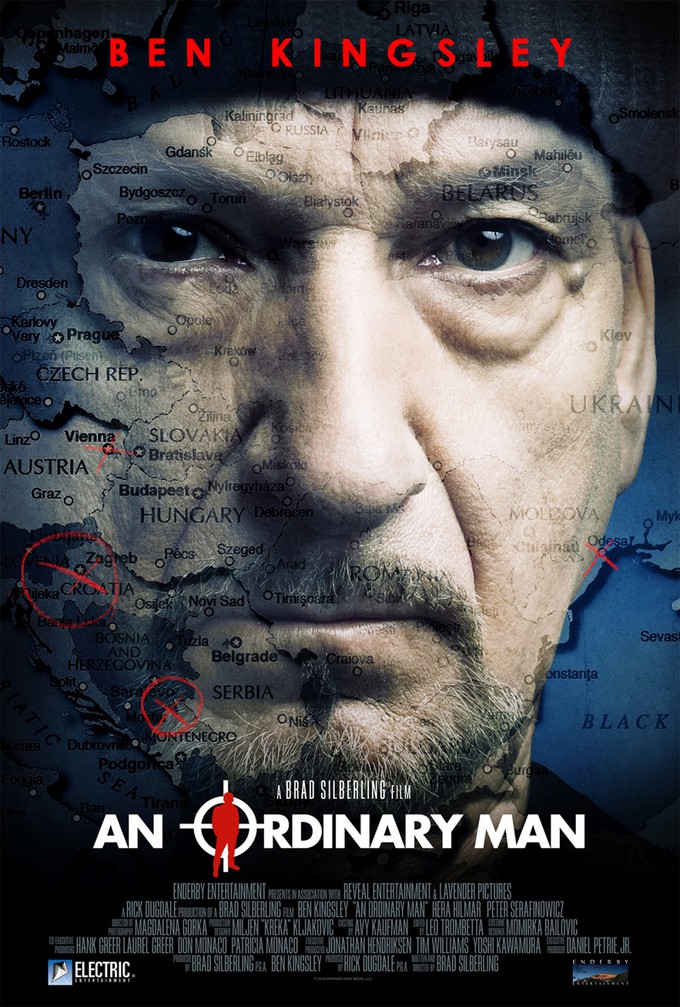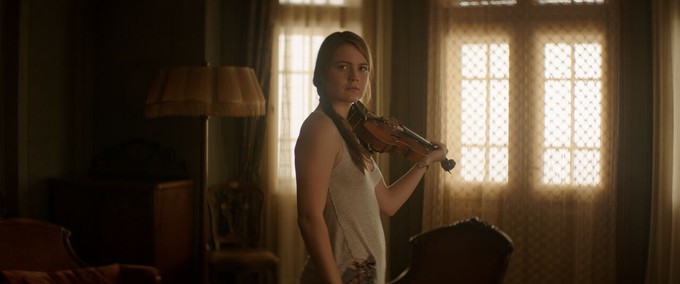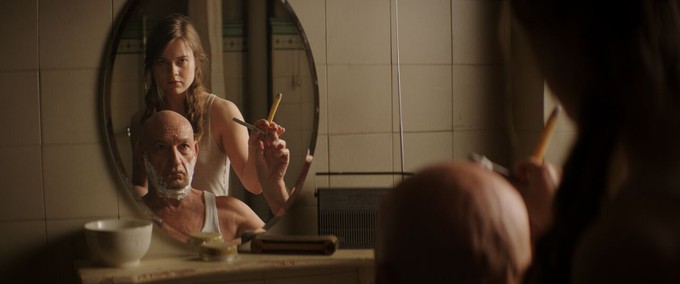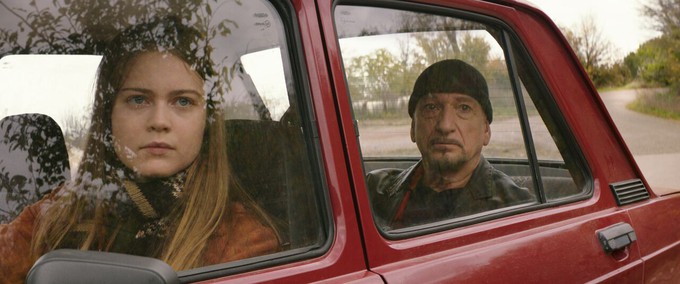
Hey folks… this past Monday I got a chance to sit down and talk to Hera Hilmar after seeing a screener for AN ORDINARY MAN last week. Hilmar is starring in the Walsh/Boyens scripted, Peter Jackson produced, Christmas tentpole film MORTAL ENGINES. For those interested in the Icelandic actor, I highly recommend checking out Hilmar's performance in THE OATH, which is on Netflix US.
AN ORDINARY MAN stars Sir Ben Kingsley and Hilmar in a tense drama about a General (Kingsley) being hunted for war crimes during the Yugoslav wars, and Hilmar as Tanja, a young woman assigned to look after him as his political allies attempt to keep him from being brought to trial. Late in life, with the net getting tighter around him, The General sees in his new housekeeper a lightning rod for all of the unresolved issues in his life. After a rocky start, The General becomes involved in Tanja’s life as he works to unravel the mysteries of her vague background.

Except for a few amazing minutes of Peter Serafinowicz, the film is mostly just Tanja and The General settling their differences: his living openly in hiding, her living secretly in the open. Sir Ben Kingsley is terrific in this. He’s just as magnetic here as in SEXY BEAST, but considerably calmer.
AN ORDINARY MAN doesn’t end in a bittersweet April/November romance. It doesn’t end comically. It’s a brutal ending that may leave a lot of audience members confused… but it’s making a greater point about cycles and accountability… sometimes a bad ending is all you can reasonably expect when characters are this complex.
Without further ado, here’s the interview:
Precious Roy: First off, let me warn you that, in researching you for the interview, I’ve seen great interview videos of you, and I just wanted to warn you that this is not likely going to be one of them-- I’m still a work in progress, so sorry if this is not one of the better moments on your press rounds!
Hera Hilmar: (laughs) That’s fine.
PR: I enjoyed An Ordinary Man—
HH: Yes…
PR: …and I felt a little wounded by it—
HH: Yes.
PR: I feel like it invited me to get comfortable with the bond Tanja and the General were forming and then reminded me it isn't a heartfelt comedy or a tender romance. It goes so tender and kind and real… and then, the real becomes a gut-punch--
HH: Yeah….
PR: Sorry, I think I'm still grieving a bit. What most appealed to you about the script, and about the character of Tanja?
HH: Well, what appealed to me… I don’t know, there are just so many elements… I just really liked the script, I really liked… I thought it was interesting to make a movie from this kind of perspective… about someone who has done things that are unforgivable, and still goes on living life in that kind of a way… and someone who represents another generation and another mindset that this young woman suddenly appears in…
PR: Right… we think we’re there to criticize The General through Anna, but no, you’re right, it’s his commentary, really, played against her.
HH: …and, also, there’s the element of a young woman with an older man… for me, it was very much like a generational thing, of any situation in the world… the film doesn’t really go deep into the pain of what is behind a story like this….
PR: That might bog it down, to have the characters try to answer for all of that pain…
HH: …it’s not even really able to… And that, to me, I found quite interesting, because we sometimes see… a side to life that is maybe connected to all kinds of horrible things…
PR: Mmm.
HH: We happen to see this particular story about these people and the years of pain locked between them... yeah, that really drew me to this script. I found it very good, also, to play a character that is in many ways I found her to be quite a strong woman…
PR: I guess you’d have to be to hold your own with The General.
HH: Yes. She has to swallow so much in this story… there’s so much from him, that she has to take, quietly? And I think it represent the situation of so many women in this world, and I get the opportunity to go, ‘No, I’m not okay with this.’ So I found that interesting about it too.
PR: I see…
HH: And, also, just working with Brad (Silberling) and (Sir) Ben (Kingsley)… I saw it as an amazing opportunity for me as an actor, you know?
PR: Yeah… what kind of research did you do for Tanya?
HH: I did a lot of watching documentaries about the Yugoslavian war, because even though I think this movie is kind of about… we filmed everything in Serbia and Belgrade, so in that way, it’s set in that world, but I think the visuals in these places represent a way bigger story than that. And in order to make Tanja real, I thought, ‘What do I have to work with?’ And what I have is this country, and its people and its story… I grew up personally just seeing it on t.v., what was happening in Yugoslavia at that time, and it was kind of always on t.v., and I come from a way more sheltered society in Iceland, and I’ve never had to experience war… so I tried to get myself in the mentality of it… Although she hasn’t… well, Tanja’s old enough to have experienced war, in some way or form, but in a very different way to The General, because she’s in a completely different age than he is… So, I did a lot of research on that, and I spent a lot of time in Belgrade, just going around looking into the city, and its history, and talking to people, everywhere… the whole crew on the film is Serbian, and there’s people in shops and random places that you go to when you’re filming or living in a place… And then me and Ben did some character work together, and we talked about how we wanted to represent these characters and tell the story with Brad. And that’s mainly what we did.

PR: In prepping for our talk, I did some research… I actually watched some of your earlier work, including THE OATH…
HH: Okay, cool!
PR: I still have yet to see THE OTTOMAN LIEUTENANT, but I know Ben Kingsley was also in that film. Did you get to work with him in many scenes, and how did it compare with going to the adversarial nature of the beginning of Tanja and The General's exchanges?
HH: Yeeeeah, we did… Ben is kind of like…. we had a lot of scenes together even though Ben is kind of like the older, wiser character in THE OTTOMAN LIEUTENANT, that sort of appears here and there, overseeing the whole thing… He was there for a few weeks, and we just sort of did all this stuff at that time, and we got kind of a good bit together, where we really went into things… But, what I found with Ben was, when we met on the set… I hadn’t really met him properly before we started filming, and we just met in the scene…
PR: Right…
HH: And we really just played well off each other as actors, and he’s obviously… he’s just a really good actor, and very present in his work, so I really enjoyed that. We just had certain scenes and lovely moments that meant something to us as actors, and out of that came the idea to do this together. And this was very different. In THE OTTOMAN LIEUTENANT, he plays this troubled doctor… (my character) wants to be a doctor because of the times, so she works to be a nurse… she looks up to him in a big way, and she also helps him out, out of his addiction and his grief, and stuff like that… But with this film, the General she’s there to help him, and she gets to know him as a person, as a human being, but she doesn’t look up to him the way my OTTOMAN LIEUTENANT character looked up to his doctor. There was a different kind of thing going on.
PR: He confronts her on their road trip in the car… it’s a very different thing, because she can’t look up to him, in some ways. She’s got to accept that he’s horrible… but he also gives her questions about her own life, and I thought that was great… and the way the two of you work together throughout the whole movie… it’s a movie that’s very much just the two of you working out who your characters really are.
HH: Yeah… are you talking about the scene where I’m driving, and I’m trying to get some information…?

PR: Yes, towards the end!
HH: Yeah, yeah, exactly… I know, I mean… Look, I think that’s what’s interesting about the story. It is in that grey area of what do you do with… how do you… when you have to protect someone and take care of them, and they’re also way higher than you on the ranking system of society, or of our work… and at the same time, you don’t agree with what they’ve done… but also, maybe, some part of you knows why they did it, but it doesn’t mean that you think it’s good… and you are born into all of this, and like Tanja, she lost both her parents to the war… It’s like that thing where the General tells her, “You don’t ask any questions, you don’t want to know about it”… this whole generation doesn’t want to know anything about what happened… and it’s interesting, we’re a generation that has so much information, and we’re also a generation that doesn’t want to ask questions…
PR: Yeah!
HH: I don’t know… it’s fun… it was fun as actors to be one on one… and for me, as an actor, it was like a Masterclass, to work so intensely and so long of that caliber, like Ben…
PR: You do such an incredible job of making complex characters believable. In terms of advice you could give young actors looking to become character actors: what helped the most with Anna?
HH: What helped the most?
PR: Yeah, what helped you.. ‘get to’ Anna. That’s not a simple character. She is complex. She is more aware of what is happening than she will allow herself to admit.
HH: I think it depends on the part that you are doing… it’s a matter of figuring out, ‘what is the key?’. I think very often you just sense something that will get you there. Like with Tanja, it was the documentaries, because I think Tanja is a reflection of the history of that region, as well. With Anna, I think… with me, I’ve never been, for example, addicted to drugs, or used a lot of drugs. So, I had to understand better how to play that, and understand where the need comes from, and where in the cycle of addiction you are…
PR: Wow.
HH: (laughs) So I watched a lot of videos of people on drugs… I read a lot about drug usage… literally, the effects, and how it looks from the outside. In terms of her drug use, there’s just that question of character, and like, who is Anna in society, and because this story took place in Iceland where I grew up… who are you? It’s a small community, so you would know what it means to grow up in that kind of neighborhood… what It means having a dad who’s a heart surgeon…. Having a mother who just disappeared… like, all these things, how would it affect you? I like also finding people around me that have elements that remind me of the characters…
PR: So, for example, you knew someone who loved someone really bad for them at some point?
HH: YEAH! Totally. I mean, you know people that have been in those situations, and you know people who have been in the bad place with substance abuse, and you just kind of draw on those moments and what are they about… and what is driving people? What is making them not do certain things? And love makes you do all kinds of stuff—or, thinking you’re in love—or the need for attention, or approval, or something you’re maybe not getting from somewhere else… and in society… on AN ORDINARY MAN, we had costume supervisors that were from Serbia. I wanted there to be elements that were very Serbian, in terms of hairstyle… and the same with Iceland. Like, I borrowed a cap from a friend, that reminded me of a very specific element in that age of people in Iceland. You just sort of pick things and put them together, as best as you can… and try to create something out of it, you know?
PR: Sure!
THANK YOU FOR THE CHANCE TO SPEAK, Hera! AN ORDINARY MAN opens today (April 13th, 2018) in theaters, VOD, and Digital HD.
— Precious Roy
